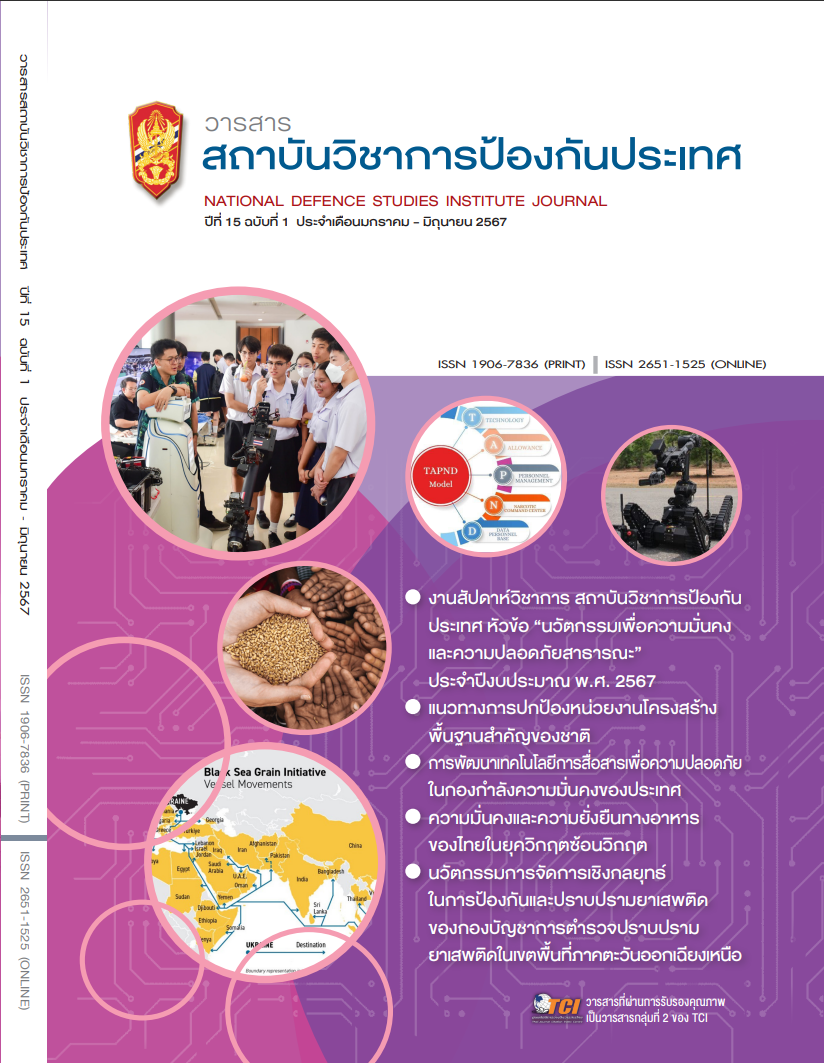Food Security and Sustainability of Thailand in the Era of Polycrisis
Main Article Content
Abstract
This article aims to present approaches for establishing food security and sustainability in Thailand by elucidating the importance of the global food system in what is termed a “polycrisis”. This term refers to the current era characterized by multiple concurrent, interconnected, and mutually impactful crises spanning various dimensions, including international stability, domestic governance, food, energy, economy, and environment. These interconnected crises have the potential to lead to a “food catastrophe”. An example highlighted is the Russia-Ukraine war, which significantly impacts global food security. Amidst crises, many countries have increasingly turned to self-reliance by producing food domestically and adopting protectionist policies to ensure food security. Given the high uncertainty of these situations, countries cannot predict future food shortages, leading to an era where nations seek to bolster their food security by acquiring food security resources from other countries.
Currently, Thailand has a relatively strong capacity to produce food to meet domestic demand. This is reflected in the Self-Sufficiency Ratio (SSR), which compares the quantity of food produced domestically to the quantity required for annual consumption. This indicates that Thailand enjoys food security and self-sufficiency, meaning it is highly unlikely to face food shortages. However, Thailand still relies on importing certain agricultural products, particularly animal feed. Global crises can impact the cost of food in Thailand, especially if multiple crises occur simultaneously and the government fails to manage them, leading to “stagflation”, characterized by a slowdown in economic growth and high inflation. Consequently, the purchasing power of the people in the country will decline. During that times, even though there is enough food, the citizens will not be able to afford to buy it. That implies that the country lacks both food security and sustainability.
Article Details

This work is licensed under a Creative Commons Attribution-NonCommercial-NoDerivatives 4.0 International License.
The articles, images, tables, graphs, written content, and opinions published in this journal are solely those of the authors and do not necessarily reflect the views or positions of the National Defence Studies Institute or its academic affiliates.
References
กอปร์ธรรม นีละไพจิตร. (2565, 14 กันยายน). กลไกความมั่นคงทางอาหารอาเซียน. กรุงเทพธุรกิจ, น.8.
“จีน” ยึดธุรกิจเกษตรทั่วโลก ภารกิจ “ความมั่นคงอาหาร”. (2565, 3 กันยายน). ประชาชาติธุรกิจออนไลน์, สืบค้นเมื่อ 14 มีนาคม 2567, จาก https://www.prachachat.net/world-news/news-1036255
ชัญญา อินทร์ไชยา. (2564). โรงงานน้ำตาล-โรงไฟฟ้าชีวมวล ความไม่มั่นคงทางอาหารบนยุทธศาสตร์ชาติ 20 ปี. สืบค้นเมื่อ 23 กุมภาพันธ์ 2567, จาก https://waymagazine.org/food-security-and-sugar-factory
ชัยวัช โซวเจริญสุข. (2565). อุตสาหกรรมอาหารในอนาคต. สืบค้นเมื่อ 18 ธันวาคม 2566, จาก https://www.krungsri.com/th/research/research-intelligence/future-food-2022
ฐานเศรษฐกิจ. (2567ก, 4 มกราคม).ส่งออกอาหารเดือด ไทยทะยานอันดับ 12 โลก เล็งปีมะโรง 1.6 ล้านล้าน. ฐานเศรษฐกิจ,สืบค้นเมื่อ 24 เมษายน 2567, จาก https://www.thansettakij.com/business/trade-agriculture/584974
______. (2567ข, 28 เมษายน). รัฐ-เอกชนจัดระเบียบ “ฟิวเจอร์ฟู้ด” เล็งส่งออกปีนี้ทะลุ 1.48 แสนล้าน. ฐานเศรษฐกิจ,สืบค้นเมื่อ 15 พฤษภาคม 2567, จาก https://www.thansettakij.com/business/trade-agriculture/594718
ธัญชนก สินอนันต์จินดา. (2564). ความ ‘ไม่’ มั่นคงทางอาหาร ภัยคุกคามจากรัฐแด่ประชาชน. สืบค้นเมื่อ 18 ธันวาคม 2566, จาก https://waymagazine.org/food-security-agriculture
เศรษฐา ทวีสิน. (2566, 23 มกราคม). ความมั่นคงทางด้านอาหาร อาหารแห่งอนาคต (Future Food) คือพระเอกจริงหรือ. มติชนออนไลน์, สืบค้นเมื่อ 12 มีนาคม 2567, จาก https://www.matichon.co.th/economy/news_3784750
สันติ ชัยศรีสวัสดิ์สุข. (2565). ความมั่นคงทางอาหารกับความยั่งยืน. สืบค้นเมื่อ 18 ธันวาคม 2566, จาก https://thaipublica.org/2022/12/nida-sustainable-move12
สำนักงานสภาพัฒนาการเศรษฐกิจและสังคมแห่งชาติ. (2566). รายงานการวิเคราะห์สถานการณ์ความยากจนและความเหลื่อมล้ำในประเทศไทย ปี 2565. กรุงเทพฯ: สำนักงานสภาพัฒนาการเศรษฐกิจและสังคมแห่งชาติ.
Abnett, K. (2023, 17 March). EU countries seek to weaken livestock emission limits. Reuters. Retrieved March 13, 2024 from https://www.reuters.com/business/environment/eu-countries-seekweaken-livestock-emission-limits-2023-03-16
Attah, A. (2023). How to maintain global food security during a ‘polycrisis’. Retrieved February 28, 2024 from https://www.weforum.org/agenda/2023/06/global-food-security-during-a-polycrisis.
Braun, K. (2024). Black Sea grain exports beating early market ideas by substantial degree. Reuters. Retrieved March 15, 2024 from https://www.reuters.com/markets/commodities/black-sea-grain exports-beating-early-market-ideas-by-substantial-degree-braun-2024-03-11
Capri, A. (2022). After Ukraine: The new geopolitics of food security. Hinrich Foundation.
European Parliament. (2024). Reducing pollution from industry and large livestock farms. Retrieved March 13, 2024 from https://www.europarl.europa.eu/news/en/press-room/20240308IPR19007/ reducing-pollution-from-industry-and-large-livestock-farms
Food and Agriculture Oraganization of the Inited Nations. (2006). Policy Brief: Food Security. Rome:Food and Agriculture Organization of the United Nations.
_______. (2022). The Future of Food and Agriculture: Drivers and Triggers for Transformation. Rome: Food and Agriculture Organization of the United Nations.
Four Paws. (2022). Why ending factory farming must be at the heart of urgent climate action. Vienna: Four Paws International
How much grain is Ukraine exporting and how is it learing the country?. (2024, 2 April). BBC. Retrieved April 15, 2024 from https://www.bbc.com/news/world-61759692
Igini, M. (2024). Why Global Food Security Matters in 2024. Retrieved February 28, 2024 from https:// earth.org/global-food-security
Laborde, D., & Mamun, A. (2023). When Policy Responses Make Things Worse: The Case of Export Restrictions on Agricultural Products. Tokyo: Asian Development Bank Institute.
Laff, M. (2023). World leaders call on Russia to rejoin Black Sea grain deal. Retrieved March 11, 2024 from https://lu.usembassy.gov/world-leaders-call-on-russia-to-rejoin-black-sea-grain-deal
Lawrence, M. (2023). Mapping the global systemic consequences of the Ukraine-Russia War. Retrieved March 6, 2024 from https://cascadeinstitute.org/mapping-the-global-systemicconsequences-of-the-ukraine-russia-war
Patabendige, C. L. C. M. (2023). Food Insecurity: The Current Crisis. Retrieved May 15, 2024 from https://www.defence.lk/Article/view_article/27082
Singapore Food Agency. (2022). A sustainable food system for Singapore and beyond. Retrieved March 15, 2024 from https://www.sfa.gov.sg/food-for-thought/article/detail/a-sustainablefood-system-for-singapore-and-beyond
World Economic Forum. (2024). AI for agriculture: How Indian farmers are harvesting innovation. Retrieved March 15, 2024 from https://www.weforum.org/impact/ai-for-agriculture-in-india


